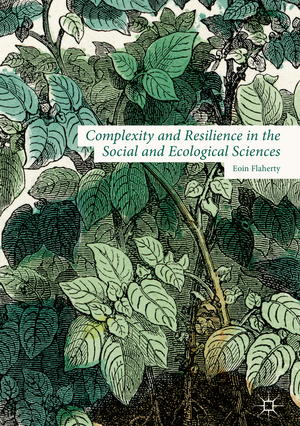Complexity and Resilience in the Social and Ecological Sciences
Autor Eoin Flahertyen Limba Engleză Hardback – 28 aug 2018
Preț: 893.05 lei
Preț vechi: 1089.08 lei
-18% Nou
Puncte Express: 1340
Preț estimativ în valută:
170.91€ • 177.96$ • 144.44£
170.91€ • 177.96$ • 144.44£
Carte tipărită la comandă
Livrare economică 11-25 martie
Preluare comenzi: 021 569.72.76
Specificații
ISBN-13: 9781137549778
ISBN-10: 1137549777
Pagini: 216
Ilustrații: XXX, 265 p. 2 illus.
Dimensiuni: 148 x 210 x 27 mm
Greutate: 0.5 kg
Ediția:2019
Editura: Palgrave Macmillan UK
Colecția Palgrave Macmillan
Locul publicării:London, United Kingdom
ISBN-10: 1137549777
Pagini: 216
Ilustrații: XXX, 265 p. 2 illus.
Dimensiuni: 148 x 210 x 27 mm
Greutate: 0.5 kg
Ediția:2019
Editura: Palgrave Macmillan UK
Colecția Palgrave Macmillan
Locul publicării:London, United Kingdom
Cuprins
Foreword; David Byrne.-Introduction.- Chapter 1. A Brief History of Systemic Thought in the Social and Natural Sciences.- Chapter 2. Complexity Theory: Societies as Complex Systems.- Chapter 3. Social-Ecological Resilience: Human Ecology as Theory of the Middle Range.- Chapter 4. Contextualising Complex Systems: Modes of Production and Social-Ecological Metabolism.- Chapter 5. Conclusion: A Complexity-Informed Approach to the Study of Social-Ecological Systems.
Notă biografică
Eoin Flaherty is Assistant Professor of Sociology at University College Dublin, Ireland. He studies patterns of inequality over time, and how they are formed, and maintained.
Textul de pe ultima copertă
‘There are books one reads and which provide so much of value that it is immediately obvious that they will shape your own way of thinking and working for a long time to come. Paul Cilliers’ Complexity and Postmodernism (1998) had that effect on me and continues to do so. Flaherty has written another with the same potential. Read it.’
-Professor David Byrne, Department of Sociology, Durham University, UK
‘This is a landmark publication. Flaherty makes a compelling case for the integration and fusion of ecological resilience and complexity theory to create a novel framework for complexity-based social science and resilience-based human ecology. Flaherty’s book offers a bold and innovative approach to understanding and working though the anthropocene. It is appropriate that a book on the centrality of complexity thinking puts forward creative injunctions for greater interdisciplinarity, and for a methodologically rigorous and normatively progressive navigation of the anthropocene. Complexity and Resilience in the Social and Ecological Sciences has cleared a path that others will follow.’
-Professor John Barry, School of History, Anthropology, Philosophy and Politics, Queen’s University Belfast, Ireland
This book introduces a new approach to environmental sociology, by integrating complexity-informed social science, Marxian ecological theory, and resilience-based human ecology. It argues that sociologists have largely ignored developments in ecology which move beyond functionalist approaches to systems analysis, and as a result, environmental sociology has failed to capitalise not only on the analytical promise of resilience ecology, but on complementary developments in complexity theory. By tracing the origins and discussing current developments in each of these areas, it offers several paths to interdisciplinary dialogue. Eoin Flaherty argues that complexity theory and Marxian ecology can enhance our understanding of the social aspect of social-ecological systems, whilst a resilience approach can sharpen the analytical power of environmental sociology.
Caracteristici
Discusses the nascent fields of Social-ecology, resilience and environmental sociology Explores the inherent deficits in environmental research and knowledge and the need for an integrated theory of society and nature Draws on economics, social theory and methodology, geography, sociology, environment studies, and encourages further multidisciplinary approaches to research
